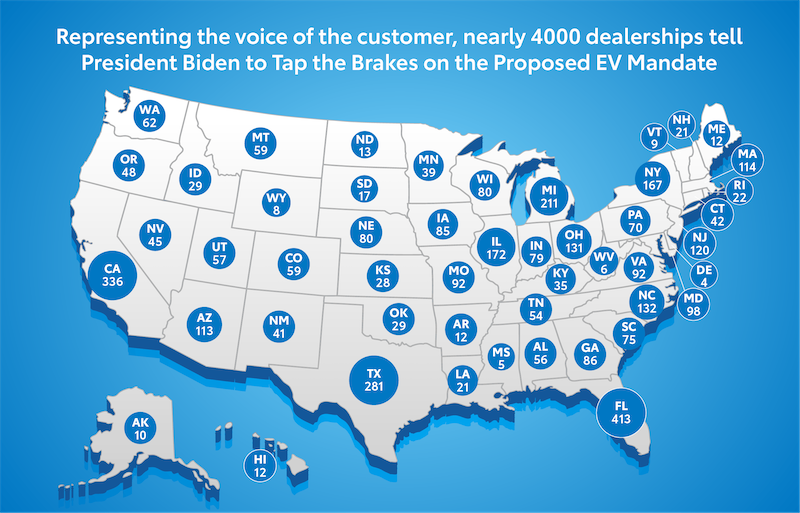Car dealers are asking President Joe Biden to “tap the brakes” in his administration’s electric vehicle (EV) push.
A total of 3,882 franchised car dealers the U.S., calling themselves the EV Voice of the Customer, published the letter on Nov. 28 that urged a slowdown due to U.S. car buyers not ready to make such a change to Battery Electric Vehicles (BEV) .
“Last year, there was a lot of hope and hype about EVs,” the letters states. “But that enthusiasm has stalled. Today, the supply of unsold BEVs is surging, as they are not selling nearly as fast as they are arriving at our dealerships—even with deep price cuts, manufacturer incentives, and generous government incentives.”
“Mr. President, it is time to tap the brakes on the unrealistic government electric vehicle mandate…. allow time for the American consumer to get comfortable with the technology and make the choice to buy an electric vehicle.”
President Biden’s Green Plan
At issue is the Environmental Protection Agency’s tailpipe regulations announced in April designed to improve air quality and reduce U.S. greenhouse gas emissions.
According to the White House, under the regulations, 67% of new sedan, crossover, SUV and light truck purchases, up to 50% of bus and garbage truck purchases, 35% of short-haul freight tractor purchases, and 25% of long-haul freight tractor purchases could be electric by 2032.
President Biden previously set a goal of ensuring 50% of car purchases are electric by 2030. The White House at that time said the rules would provide a “clear pathway for a continued rise in EV sales.”
Issue of Supply and Demand
But auto dealers in the letter are asking to slow down the proposed regulations mandating BEV production and distribution, noting that there are currently a glut of BEVs available for consumers to purchase.
“These vehicles are ideal for many people, and we believe their appeal will grow over time,” the wrote. “The reality, however, is that electric vehicle demand today is not keeping up with the large influx of BEVs arriving at our dealerships prompted by the current regulations. BEVs are stacking up on our lots.”
Gas-powered cars represented 93% of all new car sales in 2022, according to a report from the Alliance for Automotive Innovation. And EVs remain far more expensive and less efficient than alternatives.
Contact With Consumers
Arguing that “no government agency, no think tank, and no polling firm knows more about the automobile customer than us,” the dealers report that it has becomes more apparent with each passing day “that this attempted electric vehicle mandate is unrealistic based on current and forecasted customer demand. Already, electric vehicles are stacking up on our lots which is our best indicator of customer demand in the marketplace.”
The group says they are not taking a position on the policy—“as retail automotive dealerships, we are agnostic as to what we sell”—but are just reporting on what they are experiencing in the showroom when meeting customers.
“Some customers are in the market for electric vehicles, and we are thrilled to sell them,” they wrote. “But the majority of customers are simply not ready to make the change.”
Issues Cited
Among the concern dealers said were cited by customers include affordability, lack of charging infrastructure at home or work, concerns about the loss of driving range in cold or hot weather, and daily commutes that do not provide time for charging the extra time to charge the battery. The dealers believe these challenges will be addressed by manufacturers, but more time is needed then the Biden Administration’s plan allows.
“Today’s current technology is not adequate to support the needs of the majority of our consumers,” the dealers argue. “Truck buyers are especially put off by the dramatic loss of range when towing… And finally, many people just want to make their own choice about what vehicle is right for them.”
The letter ends with the group urging President Biden to “allow time for the battery technology to advance. Allow time to make BEVs more affordable. Allow time to develop domestic sources for the minerals to make batteries. Allow time for the charging infrastructure to be built and prove reliable.”








